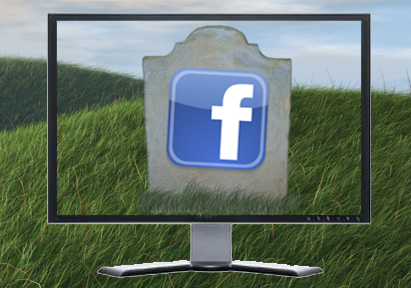February 17, 2015 Mike Johansson
 Facebook has announced what it calls Legacy Contacts - people who can manage your Facebook after you die
Facebook has announced what it calls Legacy Contacts - people who can manage your Facebook after you dieThree cheers for Facebook for beginning to address the issue of death and our online presences.
This week Facebook announced it will begin allowing you to designate someone — whom it calls a "legacy contact" — to manage parts of your Facebook accounts posthumously.
Facebook is the second major online business to allow for designating digital executors (Google allowed this starting in 2013).
According to a Wall Street Journal story (Facebook Heir? Time to Choose Who Manages Your Account When You Die) Facebook legacy contacts will be able to manage accounts in a way that can turn the deceased person’s Facebook page into a kind of digital gravestone.
The story says: "Legacy contacts can write a post to display at the top of their friend’s memorialized profile page, change the friend’s profile picture, and even respond to new friend requests on behalf of the deceased."
But has Facebook gone far enough to help those of us left behind?
Attorney Scott L. Malouf, of Rochester, N.Y. helps other attorneys use social media and businesses minimize the legal risks of social media use, and he thinks not.
A "Legacy Contact won’t be able to remove posts or photos that a deceased user might want taken down posthumously," he says by way of example.
"Similarly, the legacy download does not include security or settings information which might be useful in tracking down other online accounts that an executor needs to access."
And what of user incapacity and accounts requiring immediate and ongoing access?
Malouf asks what would happen, for example, if a business owner were in a serious car accident and wanted a trusted staffer to have immediate access to relevant email, business records, collaboration and project management services, and social accounts.
"The introduction of the legacy contact feature is a great first step," Malouf says, "But it can’t be seen as a complete solution to deceased or incapacitated users."
How to set up a ‘Legacy Contact’
Of course having a legacy contact is only possible if you, the Facebook page owner, designate someone. So how do you do that?
- Open Facebook. Click Settings (pull-down menu top right) and then Security (on the left side)
- “Legacy Contact” will be an option at the bottom of the Security page
- You will be asked to select someone you trust
- You will then be asked if you’d like to now send them a message telling them why you chose them or selecting the option to do this later
- You can also check the option to delete the account upon your death (see image)
So, what do you think? Do Facebook’s new settings allowing the appointment of a legacy contact go far enough? What more would you like to see the social network offer?
February 15, 2015 Irfan Ahmad
"Why do brands care about Millennials? By 2020, Millennials will have a total of more than $1.4 trillion in spending power. For brands, that means that if you are not reaching Millennials, you are not keeping pace with the future. Content drives brand connections, but if your content is completely failing to engage your target audience, then what is the point? 62% of millennials feel that online content makes them feel more connected and loyal to brands, but only 32% find today's brand communications helpful. There is a serious opportunity to be seized in millennials, but there are some necessary elements brands must include in their content strategies to strike while the iron is hot and convert millennials into life-long brand advocates."
Take a look at this infographic created by newscred illustrating why your content marketing efforts fail to reach your target audience.
Some key takeaways:
You completely ignored their cultural interests.
64% of young generation respond positively to content that is tailored to their cultural interest. When it comes to engaging millennials, creating content tailored to their interests is extremely important. This means you need to keep in mind their age, location, and cultural interests at all times. This also means you need tools to help you develop a deep understanding of who they are, where they are, and what motivates them.
You decided you don't want to be useful or helpful.
Millennials are bombarded with over 5,000 marketing messages a day. They have learned how to completely ignore the things that don't deliver value to their lives. If your content is "dead weight" to their day, they don't have time to read it.
Click image to enlarge.
 Can Content Marketing Help Companies Reach Consumers When They're Young? (Infographic)
Can Content Marketing Help Companies Reach Consumers When They're Young? (Infographic)H/t [Entrepreneur]

